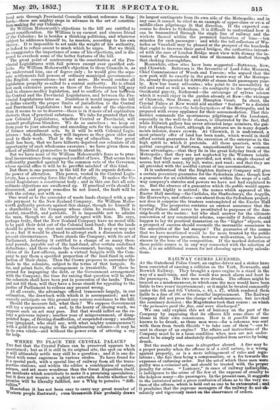RAILWAY CRIMES LICENSED.
AT the Gateshead Police Court, an engine-driver and a stoker have been convicted of causing a collision on the York, Newcastle, and Berwick Railway. They brought a spare engine to a stand in the way of a mail-train, and the result was much alarm and hurt to the passengers. The two men were drunk. The offence might be treated as a misdemeanour, in which case the men would have been liable to two years' imprisonment; or it might be treated summarily under the 5th and 6th Victoria, c. 45, s. 27, which rendered them liable to a fine of 10/. or two months' imprisonment. The Railway Company did not press the charge of misdemeanour, but invoked the summary decision : the Magistrates took that course : on whieh "the prisoners paid the fine, and were discharged."
We can only explain this act of leniency on the part of the Company by supposing that its officers felt some share of the blame in their own consciences. Row is it possible that mall known to be drunk, as these men were—for a ookeman was Dent with them from South Shields "to take care of than "—can be sent in charge of an engine P The affairs and instructions of the Company must be in a loose condition when men are not under- stood to be simply and absolutely disqualified from service by being drunk. But the result of the case is altogether absurd. A fin. e may be a proper penalty when the offence is of a civil nature, is a wrong against property, or is a mere infringement of rules and regu- lations ; the fine then being a oompensation, or a fee towards the expenses of enforcing order. But the act of which these men were guilty was a criminal act, and should be treated. with the proper penalty for crime. "Leniency," in cases of railway indisciplmis, is indulgence to the crime of the few at the expense of cruelty to the helpless many—the passengers. lathe present ease, it suggests to the untutored mind a gross confusion of ideas as to the very na- ture of the offence, which is held out as one to be extenuated ; and it proclaims that the supreme managers of the railway do not ab- solutely and vigorously insist on the observance of orders.


























 Previous page
Previous page